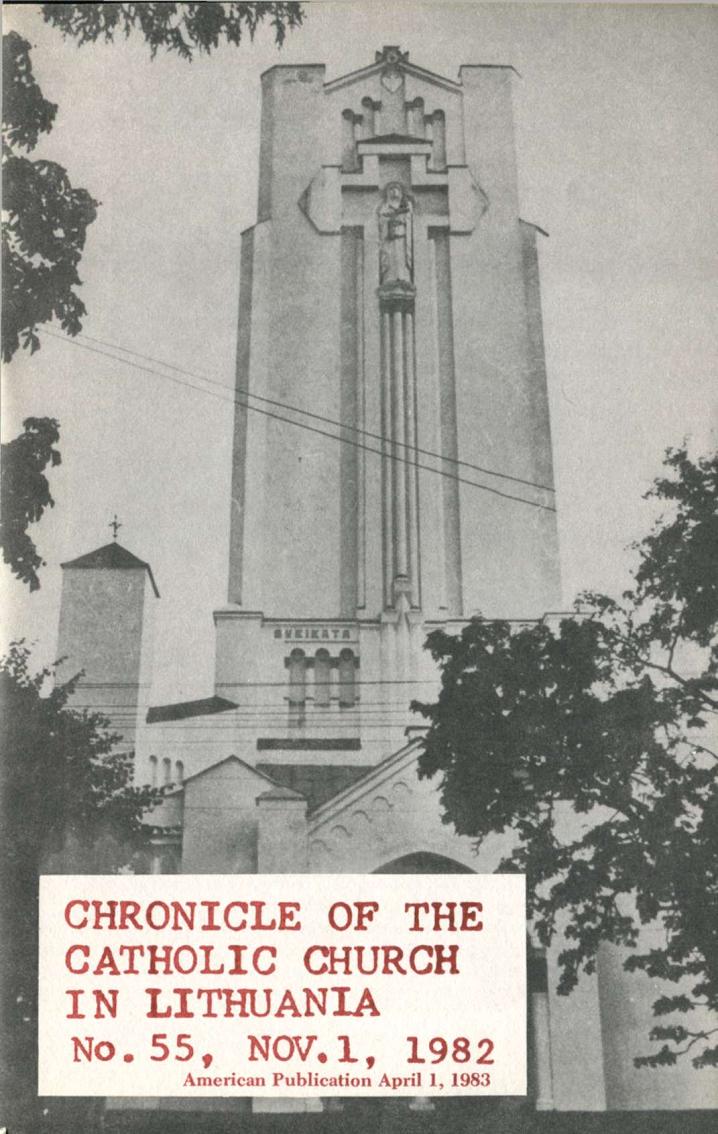
Read this and pass it on! Appearing since March 19, 1972
This issue is dedicated to those priests in Lithuania fighting for the freedom of the Church.
CHRONICLE OF THE CATHOLIC CHURCH IN LITHUANIA , No. 55
In this issue:
1. A Look at the Church Through Priests' Eyes
3. A Look at the Church Through the Window of the Council for Religious Affairs
4. Searches and Interrogations
Lithuania November 1, 1982
To: Leonid Brezhnev, Chairman of the Presidium of the Supreme Soviet of the Soviet Union
The Bishops and Administrators of Dioceses in Lithuania
A Petition
We have become concerned about the emotional attacks against religion appearing in the press lately. In the speech by First Secretary Petras Griškevičius of the Communist Party of Lithuania, it is stated: "It is necessary to strengthen in all ways the ties of international and patriotic education with the struggle to liquidate religious anachronisms." (Second Plenum of the Lithuanian Communist Party, Vilnius, June 17, 1981) Communist Party Secretary L. Šepetys has also spoken strongly against religion, and against good priests, and Commissioner of the Council for Religious Affairs Petras Anilionis strictly demands that the Regulations for Religious Associations confirmed July 28, 1976, by the Presidium of the Supreme Soviet of the LSSR be carried out.
The Catholic clergy of Lithuania would gladly welcome normalization of relations between the government of the LSSR and the Catholic Church in Lithuania. We and our faithful do not refuse to carry out the just demands of the Soviet government which do not contradict the dogma or morality of the Roman Catholic Church. We are ready to stand shoulder to shoulder in the fight against moral ills in our nation: alcoholism, family breakdown, hooliganism, the taking of unborn life, especially abortion which has spread widely since legalization by the government.
On September 2, 1982, nine priests of the Archdiocese of Vilnius, members of the Priests' Council, addressed a petition to all the bishops of Lithuania, outlining the problems of the seminary in Kaunas which require speedy and effective action.
In the sky of a bright new future, there has appeared a threatening sword of Damocles, the priests of Vilnius write. Because of poor screening of candidates, and the interference of the civil government in the seminary, a large number of unsuitable candidates has gotten into the seminary. This destructive element is a real Trojan horse in the seminary, and its deadly role is already clearly visible; in the future, the fruits of its activity will be even more bitter.
"Alarming signals concerning the undermining of discipline have reached our ears," writes the Priests' Council, "some seminarians even dare to bring liquor into the seminary; devout seminarians are ridiculed and receive anonymous notes."
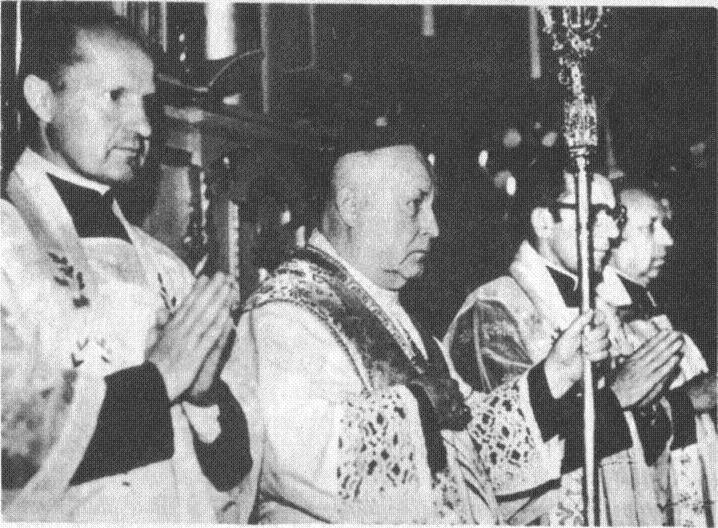
Ordination ceremonies at the Kaunas Basilica in May, 1982. Bishop Liudas Povilonis (center) officiating.
The priests regret that the seminary administration and the Ordinaries fail to show resolve with regard to unsuitable seminarians; on the contrary, they are even considering a return to the seminary of candidates irrevocably expelled for amoral behavior. Obsequiousness toward civil government, note the members of the Priests' Council, is a great injustice to the Church and a mortal blow to the seminary itself.
On May 10, 1982, in the Vilnius University of Marxism-Leninism, Deputy Juozėnas of the Council for Religious Affairs delivered a lecture to future propagandists on the topic, "Government and Religion". The purpose of the lecture was to intensify the war being waged by the atheists against the Catholic Church in Lithuania. Hence, in his lecture, Juozėnas attempted to delineate in general relations between state and religion and to bring up the defects and mistakes in the work of the propagandists, while, at the same time, pointing out ideas for the future.
In the opinion of Juozėnas, the Vatican Radio has great influence on the people, transmitting to the Soviet Union in as many as seven languages: Ukrainian, Byelorussian, Lithuanian, Latvian, Russian and Armenian. Lately, their production quality has been high, a regular youth program has materialized, programs often depend on material presented in the Chronicle and the people are somewhat more interested when they hear about this or that person living nearby and known to them.
The Chronicle of the Catholic Church in Lithuania, Juozėnas emphasized, has correspondents in various places throughout the republic, and it is not supported solely by extremist priests. To the lecturer's knowledge, there are twelve hundred women religious registered in the republic, whose numbers increase every year by ten percent, and it is estimated that there is an equal number not registered.
Vilnius
On October 11, 1982, from 8:00 AM to noon, a search was made in the rooms of Jonas Sadūnas, Marytė Sadūnienė and Nijolė Sadūnaitė. The decision to carry out the search was sanctioned October 10, 1982, by Prosecutor N. Krempovski of the Vilnius Rayon, LSSR. The order states that LSSR Assistant Prosecutor (Miss) R. Juciūtė, having acquainted herself with Criminal Case No. 57-2-031-81, regarding libel of Petras Dūkštas, Director of the Vokė Experimental Farm in the Vilnius Rayon, and having determined that on the basis of preliminary investigation she had grounds to believe that at the home of Jonas Sadūnas, living at Architektų 27-2, Vilnius, manuscripts in Sadūnas' handwriting could be found, she decided to carry out a search for Sadūnas'manuscripts.
The search was carried out by Juciūtė and a man in civilian garb, undoubtedly a chekist, who did not present idetification, or even give his name, in the presence of witnesses brought in by Juciūtė: (Mrs.) Neonila Untulienė and (Mrs.) Nijolė Rulevičienė. The chekist in charge of the search would not let Sadūnas call his place of employment to tell them that he could not come to work. Only after much pleading did the chekist allow Sadūnienė to take her six-year-old daughter to kindergarten. Since Juciūtė would not let Sadūnienė go alone, Witness Untulienė offered to accompany her; but Juciūtė ordered Witness Rulevičienė, whom she trusted, to accompany her instead.
The search was begun in Jonas Sadūnas' room. The chekist spent a long time going through all postal receipts, telegrams and religious books. He took the registration slips for seventy-eight registered letters written to political prisoners, (among them, fifteen addressed abroad). He was interested in all letters, including those written by Nijolė Sadūnaitė.
Every religious festival brings much cheerfulness and spiritual joy into the Lithuanian Catholic's gray and monotonous life. Such revitalization is introduced especially by the great festivals at Žemaičių Kalvarija (The Samogitian Calvary), Šiluva and Aušros Vartai (Our Lady of the Dawn Gates). Their influence has long ago spread beyond the borders of Lithuania: Pilgrims come from Latvia, Estonia, Byelorussia, and even far away Kazakhstan. Even though the atheistic government harasses the pilgrims in every way, thousands of people travel to the devotions each day, and afterwards, the faithful continue for a long time to share the sorrows and joys experienced.
Last year, before the great festival at Šiluva, the atheists proclaimed the existence of "Swine fewer", but they just didn't have the nerve to rescind it. This year, people waited for new "pearls" of atheist imagination which ordinarily surprised not only Lithuania, but world public opinion.
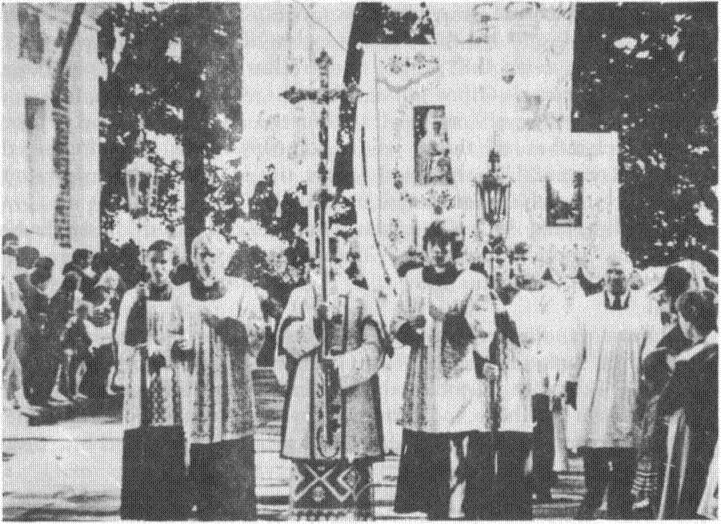
A Religious Procession in Šiluva, 1981
Since, for the second year, the government has been interfering with youth and pilgrims going to Šiluva in organized fashion (the chekists constantly repeat "In Poland too, everything started with the rosary"), since early spring this year, the faithful, singly or in groups reciting the rosary, walked to Šiluva from Tytuvėnai (9 km.) from Raseiniai (19 km.) and even from Kaunas (approximately 95 km.).
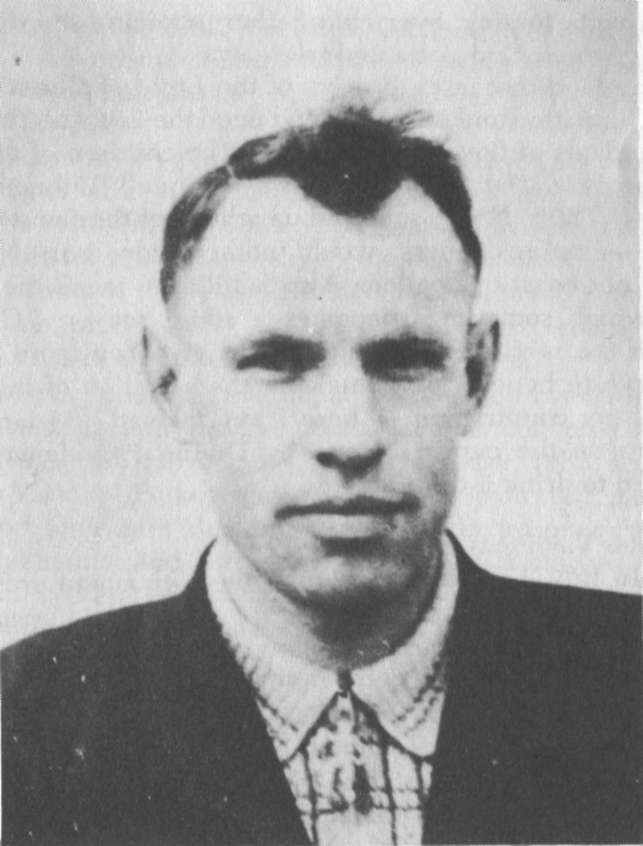
Anastazas Janulis
From the letters of Anastazas Janulis:
"... It is regrettable that not all of my letters reach relatives or other addressees. In my letters, they see something which isn't even there and delay them. Or, perhaps more simply — they want to rub me against the grain ... I thank you for all your letters . . . including those which you would like to write (and do write, mentally), but conditions and circumstances do not allow me to receive them. I'm working, but the stupid quotas keep increasing so that they are impossible to fulfill. . ."
... So if someone does not receive my letters, or I don't get their: it's not worth fussing over, but rather rejoicing as we do over everything which God gives and takes away.
"I pray God that more bearers of the Light of Christ will come forward. Our nation and our homeland need the Light of Christ so that the descendants of the Land of Crosses, the children of the Land of the Rūpintojėlis (The Pensive Christ — uniquely Lithuanian representation — Trans. Note), sons and daughters of the Land of Mary — all of us — being sinners, would not consider ourselves saints; as slaves, not boast of freedom. Also familiar to me is the following thought which sometimes becomes a silent prayer: "God of our Fathers, if the sacrifice of my life would give You more glory, if it would serve to benefit my homeland, the salvation of my soul and that of all my countrymen — here I am, take it!" So far, I have a strong grip on the cup given me by Divine Providence, and I'm determined to drink it to the dregs."
Veiviržėnai (Klaipėda Rayon)
During the night of July 26-27, 1982, in the church of Veiviržėnai, the Blessed Sacrament was desecrated. The culprits broke into the church, smashed the main altar, ana stole the tabernacle with the Blessed Sacrament. After approximately a month, the tabernacle was found in a forest about 5 km. away. The Blessed Sacrament was not in the tabernacle.
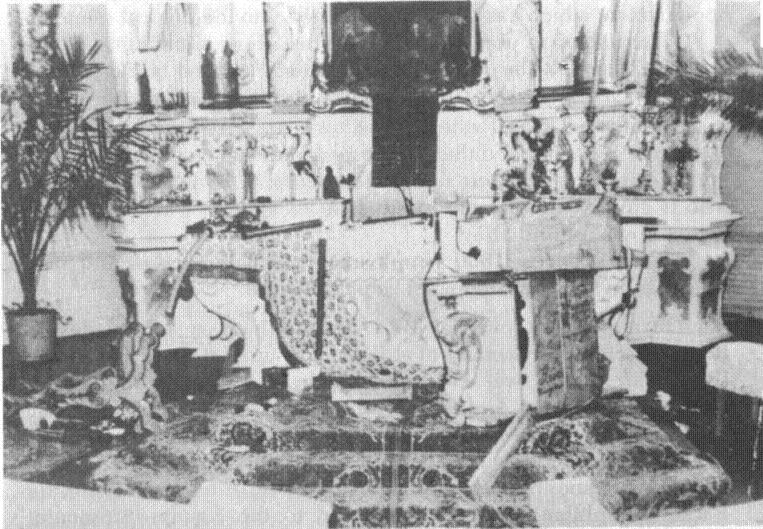
The desecrated altar of Veiviržėnai church. Additional details of the vandalism can be found in CHRONICLE OF THE CATHOLIC CHURCH IN LITHUANIA, No. 54.
On August 22, 1982, in the parish church of Veiviržėnai, services of reparation took place for the desecration of the Blessed Sacrament. They began at 10:00 AM and ended at 7:00 PM. A large church was packed with people. Participating in the services were young people from Gargždai, Kretinga and other locations in Samogitia. Holy Mass was offered on a temporary altar set up in the middle of the nave. Evening Mass was concelebrated by members of the Catholic Commėttee for the Defense of Believers' Rights, Fathers: Vincas Vėlavičius, Jonas Kauneckas and Alfonsas Svarinskas.
Pašušvys (Radviliškis Rayon)
On July 12, 1982, in the bus station, Chairwoman (Mrs.) Bronė Stulgienė of the Pašušvys District, and Teachers (Mrs.) Ona Liu-binienė and (Mrs.) Roma Siurnienė, stopped the following children coming from church: Bronius and Česlovas Matulaitis, (Miss) Lina Bitytė, Valdis Molis and others, and started to list their names.
The next day, the priest serving the church of Pašušvys, Father Juozas Vaicekauskas, inquired at the District why children preparing for first confession were intimidated and persecuted. District Chairwoman Stulgienė stated that the teaching of religion to groups of children was forbidden, and she had been taking down the children's names at the direction of Vice Chairman Alfredas Krikštams of the Executive Committee.
Telšiai
On August 18, 1982, Telšiai Middle School IV eleventh-grader (Miss) Danutė Adomaitytė was summoned to Telšiai Security Headquarters for questioning. The chekist was most worried whether the girl summoned was preparing to enter the convent and whether the landladies of the apartment she was renting were not religious women. The chekist advised her that rather than religion and church-going, it was better to enjoy the pleasures of life.
"If you do not change your way of life, we will meet during the school year," the security agent threatened.
Riga (Latvia)
On April 4, 1982, Palm Sunday evening, Father Valfreds Vinbergs was attacked and severely beaten by an unindentified man at the churchyard fence. The priest had to be admitted to the hospital for surgery on a ruptured spleen. Father Vinbergs is not telling the faithful who attacked him, and perhaps he himself does not know; however, parishioners do not doubt that it was the work of the KGB, since they have more than once noticed chekists following their pastor. One witness affirms that he once saw two chekists on the street force Father Vinbergs into a car, and take him away.
The faithful are seriously worried that Father Vinbergs could be murdered by the chekists.
Byelorussia. Armoniškės (Varanavo Rayon).
The church in Armoniškės is officially considered by the government to be nonfunctioning and closed but the people gather there every Sunday for community prayer. Rayon Security Police and Executive Committee Vice Chairman Kuzmičius constantly intimidate and threaten the faithful of Armoniškės. On Sundays, Executive Committee Vice Chairman Kuzmičius, accosting the last little old lady coming out of church began to shout:
"Do you have the keys? Turn them over, and don't let me see you here any more!"
We are grateful to the Representative of the Republic of Lithuania to the Holy See, Mr. Stasys Lozoraitis, Jr., and Voice of America Staff Member Romas Sakadolskis for their interview of October 9, 10, 1982.
We would request that similar interviews be prepared often, on various questions touching the Church and our country.
LITHUANIAN, DO NOT FORGET!
Sergei Kovalev
Antanas Terleckas
Anastazas Janulis
Vytautas Skuodis
Petras Paulaitis
Mečislovas Jurevičius
Gintautas Iešmantas
Julius Sasnauskas
Balys Gajauskas
Viktoras Petkus
Vytautas Vaičiūnas
Povilas Pečeliūnas
Algirdas Statkevičius
and others
bear the shackels of oppression in order that you might live and believe in freedom!






